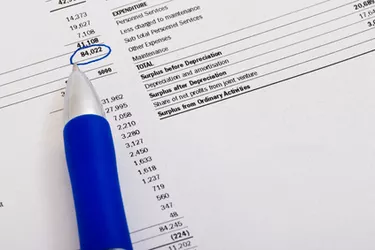
Depreciation is the process of accounting for the costs of wear and tear on an asset on a company's financial statements. Companies use different methods to determine annual depreciation expense, which reduces an asset's value on the balance sheet and is recorded as an expense on the income statement. Depreciation expense has a negative impact on a company's net income.
About Depreciation
Video of the Day
Depreciation allocates the cost of a long-lived asset, which is an asset that is expected to have a useful life of more than a year, over its useful life. For financial reporting purposes, companies use depreciation to match the timing of an asset's costs to the revenues it generates. Rather than recording the whole expense of the asset at the time of purchase, the expense is spread out over the asset's expected useful life. Depreciable assets include items such as equipment, buildings, furniture and machinery. Land is not depreciated.
Video of the Day
Calculating Depreciation
The straight-line depreciation method is the one most commonly used to depreciate an asset for financial reporting purposes. Straight-line annual depreciation expense equals depreciable cost divided by useful life, or number of expected years of use. Depreciable cost equals the asset's total cost minus salvage value, or the expected value at the end of its useful life. For example, an asset with a $100,000 depreciable cost and a 10-year useful life has a $10,000 annual depreciation expense: $100,000 divided by 10 equals $10,000.
Effects on Net Income
The total depreciation for an accounting period is recorded as a depreciation expense on the income statement. This reduces net income, which is also known as the bottom line. Net income equals revenues minus expenses. Higher depreciation expense contributes to higher total expenses, which results in lower net income. Companies with mostly older assets that have been fully depreciated and companies with few long-lived assets benefit from low depreciation expense and higher net income.
Analyzing Earnings without Depreciation
Depreciation expense is considered a noncash expense, meaning there is no actual cash outflow. Analysts and investors often assess a company's earnings without the effects of financing, taxes and noncash expenses, like depreciation. A calculation called "earnings before interest, taxes, depreciation and amortization," or EBITDA, is commonly used for this. It is calculated by adding interest, taxes, depreciation and amortization to net income. EBITDA provides a clearer picture of a company's core operating results, which can be used to compare its performance to other companies.